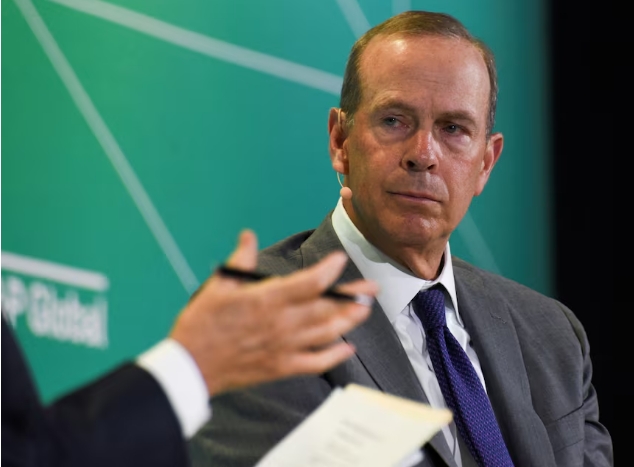Summary
Chevron’s earnings are falling short of covering dividends and buybacks. The stalled Hess deal is weighing on the company’s share price. Meanwhile, increasing production from Guyana is essential for long-term growth in oil output.
Five Years On: Chevron CEO Michael Wirth Faces Growing Challenges
Five years ago, Chevron CEO Michael Wirth earned praise from Wall Street when the company briefly surpassed Exxon Mobil in market value after he opted out of a bidding war with Occidental Petroleum. He had already addressed major challenges when the pandemic hit oil and gas demand, positioning Chevron well against rivals. The company’s shares outperformed competitors for five years until 2022.
However, as of 2024, Wirth’s legacy is under threat. Chevron’s declining earnings are no longer sufficient to cover dividends and buybacks, and project overruns in Kazakhstan and Australia have cost the company billions. Additionally, Wirth is entangled in a critical arbitration battle with Exxon Mobil that has stalled his $53 billion acquisition of Hess, which would grant Chevron a stake in a valuable Guyana oilfield managed by Exxon.
Exxon’s legal challenge has delayed the deal by nearly two years and could jeopardize it entirely by asserting a right of first refusal over the Guyana assets. Since Wirth took the helm in 2018, Chevron shares have risen 18%, while Exxon’s have increased by 31%.
Despite the challenges, company executives and industry sources indicate that Wirth’s position is secure; the board had previously granted him a retirement-age waiver as he undertook a major management overhaul. Meanwhile, Shell reported third-quarter profits of $6 billion.
Analyst Mark Kelly of MKP Advisors questioned the attractiveness of investing in Chevron given the stalled Hess deal, which has left the company without a clear growth narrative. Jake Spiering, Chevron’s head of investor relations, attributed the company’s poor share performance this year to the arbitration case, which has attracted short-sellers.
Spiering remains optimistic, asserting that Chevron is poised for significant production growth over the next year through the expansion of existing projects. However, the board is reportedly pressing for quicker earnings recovery, as profits have declined for five consecutive quarters amid falling oil prices.
To address these issues, Wirth has introduced a new leadership team, following the resignations or retirements of several top executives. A source close to the board noted that Wirth faces intense pressure regarding the Hess deal, which is seen as crucial to his tenure.
Wirth has previously demonstrated skill in high-stakes acquisitions, successfully completing deals for Noble Energy and PDC Energy during favorable market conditions. Spiering emphasized the board’s commitment to achieving high performance.
A major concern for Chevron is its ongoing dispute with Exxon and CNOOC Ltd over their Guyana offshore holdings, which include one of the largest oil discoveries in years. The Hess acquisition was originally expected to close in the first half of this year, but a decision in the arbitration may not arrive until the third quarter of next year.
Closing this deal is vital for Chevron, as it would secure a 30% stake in Guyana’s rapidly growing oil production, which generated a net profit of $1.88 billion for Hess last year. This stake would also diversify Chevron’s portfolio away from higher-risk areas like Venezuela and Kazakhstan, the latter accounting for nearly 20% of its easily accessible reserves. The Kazakh Tengizchevroil project, where Exxon holds a 25% stake, is significantly delayed and over budget.
Analyst Biraj Borkhataria from RBC Capital warned that if operational issues persist or if the Hess deal collapses, Chevron could face further underperformance.
In South America, Guyana offers an opportunity to enhance Chevron’s portfolio, which currently has a limited presence outside Venezuela. U.S. lawmakers and Venezuelan opposition leaders have called for stricter regulations on the company’s operations in Venezuela, criticizing the tax revenues supporting the Maduro regime. If Chevron were to lose its operating license there, analysts suggest it could jeopardize its ability to export around 220,000 barrels of oil per day.
Despite these challenges, Chevron has received continued authorizations to operate in Venezuela, arguing that its presence is beneficial for the country. The company is expected to report third-quarter earnings of $4.26 billion, a 35% drop from the previous year, attributed to lower oil prices and refining margins.
Market analyst Frederic Boucher remarked, “Mike Wirth is in a tough spot. If you spend two years promoting a deal and it ultimately falls through, should investors still trust you with their money?”

